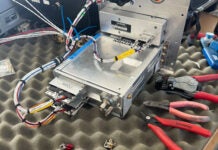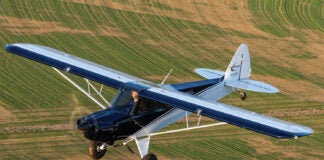Prop Balance Precursor
In addition to balance, improper clocking of the propeller on the crankshaft can also cause bad vibrations [“Smooth Out Your Ride,” June 2015]. You may have noticed that Hartzell, McCauley, and perhaps others, make sure their constant-speed propellers can be clocked only one way on the engine. There is a good reason for that: Clocking in most cases is very important.
Most fixed-pitch props can be clocked three different ways on a shaft with a six-bolt mounting configuration and four different ways on an eight-bolt mounting configuration. If you have a vibration problem, take the prop off and do a static balance. If it meets static balance, then do not unbalance the propeller to fix a vibration that is not caused by the propeller.
–Kent Tarver
Bleaching the Plane?
In “Polishing: Detail Work” in the August 2014 issue (I know—I’m a slow reader), Eric Stewart asks if someone has a foolproof method for removing scratches that doesn’t leave clouding. My secret is non-chlorinated water.
Chlorine is an aggressive reactive agent that rapidly binds with aluminum. It is so universally used, it barely registers on our “Caution, reactive chemicals!” radar.
The most-used chemical in America comes to us unlabeled in our drinking water. We wash our clothes in this weakened bleach and also our shop rags. Then we use the shop rags, along with chlorinated water, to wash our planes and wonder why the paint is fading and the aluminum is clouding.
My suggestion is to use well water if available, or boil the chlorine out of the water before use. Use your normal Micro-Mesh procedure, but use unchlorinated water for a polishing fluid and be sure your applicators are rinsed in that same water to remove any traces of chlorine. Been there, done that!
–John Dimm
Experimental Avionics and IFR
I have a question: In “Ask the DAR” [October 2014], Mel Asberry says IFR with a non-certified EFIS is OK. Now jump to March 2015. In “Maintenance Matters,” Dave Prizio says avionics must be approved for IFR to be legal. What? I’m a little confused.
–Roger Laubhan
Dave Prizio responds: Perhaps my wording was overly broad. Immediately after my remark about approved avionics, I mentioned glass panels found in many Experimental aircraft. Since all of these systems, to the best of my knowledge, rely on GPS as their sole source of navigation, and since GPS equipment must be approved for either en route or approach use depending on how it is used, by logical extension glass panel systems that do not connect to approved GPS systems are not legal for IFR use. I do not know of any exception to this rule for Experimental aircraft operating in IMC.
As for the rest of the equipment, I believe the reader is correct in that it does not need to be approved. The EAA has studied this issue extensively and you can read their opinion here.
Write to editorial@kitplanes.com.













